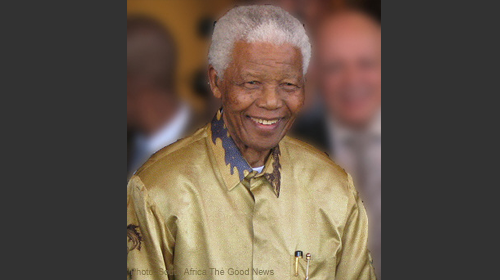
"For to be free is not merely to cast off one's chains, but to live in a way that respects and enhances the freedom of others." -- Nelson Mandela
On Thursday, the world mourned the death of former South African President and anti-apartheid freedom fighter Nelson Mandela. In death Mandela was beloved by all, but in life he had to fight for survival under a regime of globally supported racial apartheid and spent 27 years in prison as a political prisoner. For lesbian, gay, bisexual and transgender (LGBT) people, people living with HIV/AIDS and those fighting for justice for our communities, Nelson Mandelaโs leadership and lessons should continue to guide our work.
Formal Equality. When Nelson Mandela was elected President of post-apartheid South Africa in 1994, he stood in solidarity with his LGBT friends and fellow citizens. Under his leadership, the South African constitution included sexual orientation and gender among the enumerated classes protected from discrimination. This ultimately resulted in the national by gay and lesbian people and a by the South African high court extending marriage protections to same-sex couples. But Nelson Mandelaโs legacy for the LGBT community goes far beyond the formal legal protections he marshaled.
Racial and Economic Justice. The LGBT movement is a movement for racial and economic justice, as well as a movement for formal equality. Nelson Mandela saw these connections and that โovercoming poverty is not a gesture of charity [but] an act of justice.โ For Mandela, the fight to end poverty and realize racial justice was fundamental. Our movements for equality and justice must follow his guidance. Today in the United States, many LGBT people, particularly LGBT people of color, are living in poverty, struggling with unemployment and facing pervasive discrimination. A recent by the Movement Advancement Project found that LGBT workers of color are at a significant risk of being unemployed and living in poverty. Another that as many as 45 percent of homeless youth are LGBT-identified. As we continue the long fight for justice for all LGBT people, and all people, it will be important, as Dennis Parker reminds us, โto remember this man who, like a modern David, faced the Goliath of discrimination and oppression and changed the world.โ
Ending the AIDS Epidemic. Ultimately considered a transformative leader in the fight to end the HIV/AIDS epidemic, Mandela was initially for his lack of attention to HIV when he first took office. However, by 2000 when he offered the closing remarks at the 13th International AIDS Conference, Nelson Mandela was a unifying leader who called politicians, scientists and the global community to action. โIn the face of the grave threat posed by HIV/AIDS, we have to rise above our differences and combine our efforts to save our people,โ . โHistory will judge us harshly if we fail to do so now, and right now.โ With the rise of communities of color, Mandelaโs legacy is an especially important reminder of both the ease with which this struggle is abandoned and the necessity of continuing the fight to save our communities.
Prisoner Justice. Finally, a prisoner for 27 years, Mandela spoke of the importance of centering the work to change conditions of confinement and end mass incarceration. In his autobiography, Long Walk to Freedom, Mandela wrote โ[i]t is said that no one truly knows a nation until one has been inside its jails. A nation should not be judged by how it treats its highest citizens, but its lowest ones.โ There are many LGBT individuals living in prison, jails and other sites of confinement including in immigration detention and civil psychiatric detention. While in custody , gender non-conforming and individuals are frequent targets for sexual abuse and other violence. Our work must always include those members of our communities who are locked away. Mandela reminds us to keep that fight central to all our work.
In commemorating and remembering both Mandelaโs work and the unthinkable violence that he endured, we have a responsibility to honor his call for a type of justice โthat respects and enhances the freedom of others.โ May he rest in peace and may we have the courage not to recreate the injustices he endured and the strength to realize his vision.
Learn more about LGBT rights and other civil liberties issues: Sign up for breaking news alerts, , and .

